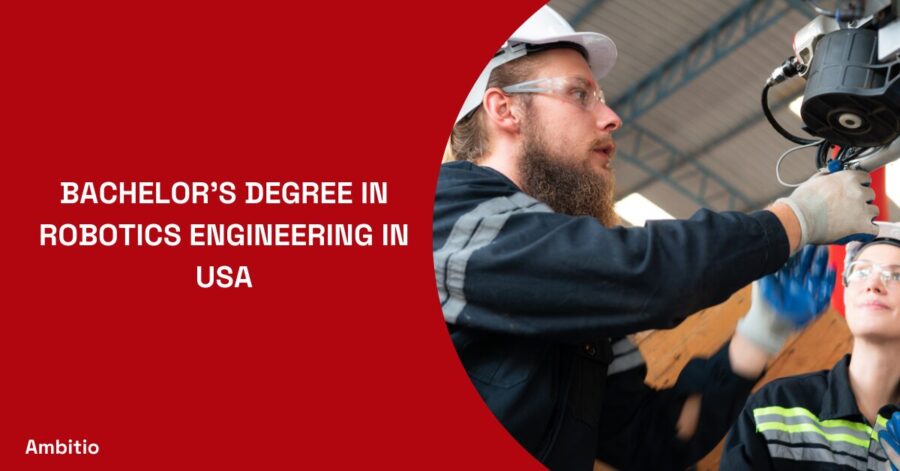14 December 2024
6 minutes read
Road to a Bachelor’s Degree in Robotics Engineering in the USA by 2024: A Comprehensive Guide

Robotics engineering encapsulates the essence of innovation, blending disciplines such as mechanical engineering, electrical engineering, computer science, and systems engineering. The USA, a powerhouse of technological advancement, offers some of the most prestigious robotics engineering programs globally.
As we edge closer to 2024, this comprehensive guide aims to demystify the pathway to obtaining a Bachelor’s degree in Robotics Engineering in the USA, spotlighting the top universities, cutting-edge specializations, scholarship opportunities, and career prospects that await graduates.
Understanding the Scope of Robotics Engineering
The Interdisciplinary Nature of Robotics Engineering
Robotics Engineering is not just about building robots; it’s about integrating systems that can potentially transform our world. Students in this field learn to create and innovate systems that can think, act, and work alongside humans to solve complex problems.
Robotics engineers are the architects of machines that can explore space, perform surgery, and even aid in disaster recovery. The interdisciplinary nature of robotics requires expertise in various fields, making the educational journey both challenging and rewarding.
The Synergy of Mechanics, Electronics, and Computing
A degree in robotics engineering from a US university encompasses a broad spectrum of subjects. Mechanical engineering principles are fundamental, as they lay the groundwork for the design and physical construction of robots.
Electronics bring these mechanical structures to life, providing the necessary power and control. Computing adds the brain, with software and algorithms that drive robotic behavior and decision-making. Together, these disciplines form the trifecta of robotics engineering expertise that students can expect to master during their bachelor’s studies.
The Role of Mathematics and Science in Robotics
Mathematics and science are the languages of engineering. Students will engage deeply with calculus, physics, and computer science, which form the backbone of a robotics engineering degree.
Understanding the theoretical aspects of these subjects is critical for designing systems that are not only functional but also efficient, safe, and reliable. Moreover, the application of advanced mathematics, like linear algebra and probability, is crucial in the development of algorithms for machine learning and artificial intelligence, which are increasingly becoming integral to robotics.
Robotics Engineering Curriculum and Specializations
The curriculum for a Bachelor’s degree in Robotics Engineering is meticulously designed to provide a solid foundation in both theory and practice. Students will take part in a robust combination of classroom instruction, laboratory work, and hands-on projects.
Core Courses and Lab Work
The core coursework typically includes subjects like dynamics, control systems, machine design, digital logic, and computer programming. Lab sessions complement these courses, allowing students to apply theory in practical settings, working directly with robotic hardware and software.
Many programs also include capstone projects, where students can demonstrate their learning by solving real-world problems or developing innovative robotic systems.
Specializations within Robotics Engineering
As the field of robotics is vast, many universities offer specializations within their robotics engineering programs. These can range from autonomous systems, where the focus is on creating robots that can operate without human intervention, to robotic manipulation, which concentrates on the precise control of robotic arms and hands.
Other specializations may include human-robot interaction, mobile robotics, and even bio-robotics, where students explore the intersection of robotics with biological systems.
The Prestige of US Robotics Engineering Universities
The United States boasts a number of prestigious institutions that are at the forefront of robotics education and research. These universities not only provide top-tier educational programs but also contribute to groundbreaking research in the field.
Cutting-Edge Research and Industry Connections
Studying at a top US university means access to state-of-the-art facilities and the opportunity to work alongside leading researchers in the field. Universities like MIT, Stanford, and Carnegie Mellon are renowned for their contributions to robotics and often collaborate with industry giants, providing students with a window into the future of the field and potential employment opportunities post-graduation.
Global Recognition and Networking Opportunities
Degrees from these institutions carry significant weight globally, opening doors to a vast network of alumni and professionals. The exposure to international conferences, workshops, and competitions further enhances students’ learning experiences and prepares them for a career on the global stage.
The Financial Aspect of Robotics Engineering Degrees
When considering a Bachelor’s degree in Robotics Engineering, particularly in the United States, financial commitment is a significant factor that students must ponder.
The cost of higher education in the U.S. can be substantial, but understanding the financial landscape and the resources available can help manage this critical aspect of your academic journey.
Understanding the Cost of a Robotics Engineering Degree
The expense of a Bachelor’s degree in Robotics Engineering in the USA encompasses more than just tuition fees. It includes a variety of costs such as housing, textbooks, lab fees, technology fees, and other living expenses.
Tuition can vary widely between public and private universities, with private institutions generally commanding higher fees. The total cost can range from $20,000 to $50,000 per year or more, depending on the university and the program’s prestige.
Breakdown of Tuition and Associated Costs
Tuition is the primary expense for any degree program. In engineering, where specialized equipment and facilities are necessary, the cost may be higher than in other disciplines.
Associated costs include lab fees, which cover the use of equipment and materials necessary for hands-on learning. Additionally, students must budget for textbooks, software licenses, and personal computers capable of running complex simulations and design software.
Living Expenses and Budgeting for Life in the USA
On-campus housing can be a convenient option for students, though it may not always be the most cost-effective. Off-campus housing, meal plans, transportation, and personal expenses can add to the financial burden. It is crucial for students to budget carefully and consider all potential expenses when planning their finances for their degree.
Navigating Scholarships and Financial Aid
Despite the high costs, the USA offers numerous financial aid options for both domestic and international students pursuing degrees in robotics engineering.
Scholarship Opportunities for Domestic and International Students
Many U.S. institutions offer scholarships to attract the brightest students in robotics engineering. Scholarships may be based on merit, demonstrating academic excellence, or need, assisting those who may not afford the full cost of education. Some scholarships are specific to the field of engineering, while others are available to all students regardless of their major.
Federal and State Financial Aid for U.S. Residents
For U.S. residents, federal financial aid, which includes grants, loans, and work-study programs, is a primary source of funding. Students can apply for federal aid through the Free Application for Federal Student Aid (FAFSA). Additionally, state governments often have their own financial aid programs, which can include scholarships, grants, and loan opportunities.
Work-Study Programs and Part-Time Employment
To offset the cost of their education, many students participate in work-study programs or take up part-time employment.
Balancing Work with Academic Responsibilities
Work-study programs, often funded by the federal government, provide students with part-time jobs related to their field of study. These positions not only help with financial needs but also offer valuable industry experience.
However, it’s important for students to balance their work commitments with their academic responsibilities to ensure their educational success is not compromised.
Internships and Co-Op Programs
Internships and cooperative education (co-op) programs provide hands-on experience and can sometimes offer stipends or wages. These programs are integrated into the curriculum and allow students to gain professional experience while earning credit toward their degree. In addition, they can lead to higher-paying jobs upon graduation, as students enter the workforce with practical experience and industry connections.
Long-Term Financial Considerations and ROI
When evaluating the cost of a robotics engineering degree, it is also essential to consider the long-term return on investment (ROI).
Earning Potential and Career Growth in Robotics Engineering
A degree in robotics engineering opens doors to a rapidly growing field with strong demand for skilled professionals. According to industry reports, robotics engineers can expect competitive starting salaries, which can significantly increase with experience. The potential for career growth in this innovative field can result in a high ROI over the lifetime of one’s career.
The Value of an Accredited Robotics Engineering Degree
An accredited degree from a reputed institution in the U.S. can enhance a graduate’s marketability. Accreditation from bodies like the Accreditation Board for Engineering and Technology (ABET) assures employers that the educational program meets the quality standards necessary to produce graduates ready to enter the global workforce. This accreditation can play a pivotal role in the earning potential and job security of robotics engineering graduates.
Preparing for a Bachelor’s Degree in Robotics Engineering
The journey to a bachelor’s degree in robotics engineering requires careful preparation. Prospective students must ensure they meet the entry requirements of their chosen university.
Academic and Language Proficiency Requirements
Universities typically require a strong foundation in mathematics and science, as well as a good command of the English language. This often means taking standardized tests such as the SAT or ACT for academic assessment and the TOEFL or IELTS for English language proficiency.
Extracurricular Activities and Personal Projects
Involvement in extracurricular activities related to STEM, such as robotics clubs or science fairs, can strengthen a student’s application. Personal projects that demonstrate a passion for robotics and engineering can also be a differentiator, showcasing creativity, initiative, and problem-solving skills.
Conclusion
As we look to 2024 and beyond, a Bachelor’s degree in Robotics Engineering from a university in the USA represents a pathway to an exciting and impactful career. The journey is rigorous but immensely rewarding, offering students the chance to become leaders in a field that promises to be at the heart of technological progress for decades to come.
With careful planning, financial foresight, and a passion for innovation, students can embark on this educational adventure with confidence, ready to shape the future of robotics on a global scale.
FAQs
What is the average duration of a Bachelor’s degree in Robotics Engineering in the USA?
The typical duration for a Bachelor’s degree in Robotics Engineering in the USA is four years of full-time study.
Can I pursue a Bachelor’s degree in Robotics Engineering if my background is not in science or mathematics?
A strong foundation in science and mathematics is generally required for robotics engineering programs. However, some universities may offer foundational courses to help students catch up.
Are there any online Bachelor’s degrees in Robotics Engineering available in the USA?
While online courses and degrees are becoming more prevalent, robotics engineering often requires hands-on experience in labs, which may not be fully available online. It’s best to research specific universities for their online offerings.
What kind of careers can I pursue with a Bachelor’s degree in Robotics Engineering?
Graduates can work in various industries such as automotive, aerospace, defense, healthcare, and consumer electronics, to name a few, in roles such as robotics engineer, automation engineer, system designer, or AI specialist.

You can study at top universities worldwide!
Get expert tips and tricks to get into top universities with a free expert session.
Book Your Free 30-Minute Session Now! Book a call now




























